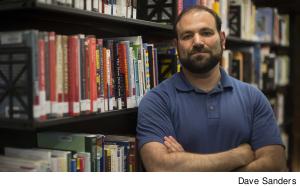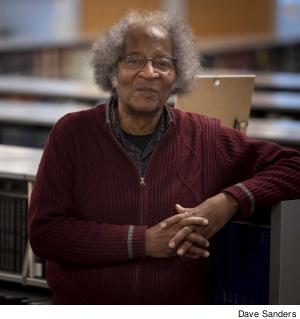Academic freedom at risk
Targeting the State of Israel through boycotts or claiming that Israel is racist could now be construed as a violation of federal antidiscrimination law following a new executive order to combat anti-Semitism signed by President Donald Trump in mid-December. Schools and colleges, including programs and activities that receive federal funding, are at risk of losing millions of dollars if sanctioned under the new order.
 |
How Trump’s order is exactly implemented is the question. Social justice advocates – both those fighting anti-Semitism and those advocating for Palestinian rights – have raised concerns that it could violate fundamental free speech rights.
“It’s not Jewish interests or safety that are served by targeting academic freedom, speech, scholarship, dissent and activism,” said David Unger, a Higher Education Assistant at the School of Labor and Urban Studies.
Noting that his grandparents were subpoenaed to testify during the McCarthy hearings because of their political activities, he added, “Coming from four generations of Jewish activists who have faced repression due to their political views and activities, such suppression of political speech and action – both on campus and in society – feels incredibly familiar.”
Trump’s executive order reiterates and expands on Obama administration guidance on how to respond to anti-Semitic incidents under current federal civil rights law. At issue is Title VI of the Civil Rights Act of 1964, which prohibits discrimination “on the ground of race, color, or national origin” for programs and activities that receive federal funding.
DEFINING JEWISHNESS
The original 1964 law does not include religious discrimination, so Trump’s order explicitly prohibits “forms of discrimination rooted in anti-Semitism,” an order consistent with Obama and Bush administration policy. That is not what is at issue for many academics. Instead, it is how the order defines Jewish identity and anti-Semitism that raises concern.
The day after the order was issued, the Middle East Studies Association of North America (MESA), a leading organization in the academic field, wrote a letter to President Trump, asking him to “revoke this executive order immediately.”
STIFLING
MESA cited the order’s design to “delegitimize and stifle scholarship and teaching” and its essentializing of Jewish identity by, in effect, construing that Jews share a common national origin.
“As you surely know, Jews in the United States and elsewhere identify themselves in a wide variety of ways, so the implication that all Jews share a common national origin is not a statement of fact but an ideological assertion,” wrote Dina Rizk Khoury, MESA president, and Laurie Brand, the chair of the group’s Committee on Academic Freedom. “Like all other citizens and residents of the United States, Jews are entitled to protection against discrimination, but we deem this an ill-informed and potentially dangerous approach to securing such protection.”
What is also a concern for many academics is how anti-Semitism is defined. When evaluating incidents, federal agencies and departments will consider the International Holocaust Remembrance Alliance’s (IHRA) definition of and examples of anti-Semitism that include, “targeting of the State of Israel” and claiming that “the existence of a State of Israel is a racist endeavor.”
Even the lead drafter of which the IHRA definition is based upon, Kenneth Stern, thinks the definition should not be applied to colleges and universities, as he wrote in the Guardian, “I’m worried that faculty, who can just as easily teach about Jewish life in 19th-century Poland or about modern Israel, will probably choose the former as safer.”
Censorship and potential self-censorship concerns many academics.
“There can be little doubt that such ‘illustrations’ of anti-Semitism will force universities to police speakers seeking justice in the Middle East, especially those supporting the BDS [Boycott, Divestment and Sanctions] Movement,” Frank Deale a professor at the CUNY school of law who teaches civil rights and constitutional law, told Clarion. “Under the Trump order, such statements will trigger complaints that could lead to the termination of federal funding to such universities, even though such statements would be deemed First Amendment protected speech when made at public universities.”
 |
The Trump order explicitly states that “agencies shall not diminish or infringe upon any right protected under Federal law or under the First Amendment,” but that is little consolation to schools and colleges that have already been singled out for perceived anti-Semitism. Complaints can be made to any federal agency or department that administers Title VI, and an investigation could be launched, typically within the US Department of Education Office for Civil Rights (OCR), where investigators visit the campus and make assessments.
If a “severe, pervasive or persistent” environment is created and if having known of the incidents a college still failed to take appropriate action, the college could lose federal funding.
THE TRUMP EFFECT
Already, the US Department of Education during the Trump administration has launched investigations at Rutgers University, Duke University, the University of North Carolina and Williams College for “anti-Semitic” speech critical of Israel, according to a source cited in Vox.
A week after the order was announced, the Lawfare Project filed a complaint against Columbia University, asking OCR to investigate “Israel Apartheid Week,” where students display a mock apartheid wall and discussed Israel’s treatment of Palestinians, according to Palestine Legal.
“NYC has been the epicenter for censorship attempts when it comes to speaking out for Palestinian freedom. That said, professors should not be cowed by Trump’s agenda,” said Radhika Sainath, senior staff attorney for Palestine Legal. “Your academic freedom and First Amendment rights to teach, research and advocate for Palestinian rights remains unchanged.”
CUNY has been the focus of scrutiny on the issue of Israel in the past. Faculty members on a variety of campuses have been targeted by pro-Israel groups for their views on the Middle East.
Posters with illustrations of two Brooklyn College professors, who have been outspoken about Palestinian rights, featured the two PSC members labeled as “Terrorist Supporters.” (Clarion reported on this incident in November 2017).
“Anyone writing, or teaching, or being an activist [on Palestinian issues] has good reason to worry that what they do will be described as anti-Semitic,” said Philosophy Professor Samir Chopra, one of the professors who was singled out in the Brooklyn College poster incident. Chopra has not fully studied the order, but does have concerns about it.
“What this does is add governmental persecution to the political and cultural hostility directed at Palestinian issues or criticism of Israel’s policies or even raising concerns about the disproportionate role that a candidate’s views on Israel have in American elections,” said Chopra.
FIGHTING ANTI-SEMITISM
The union and its members recognize that anti-Semitism – and other forms of discrimination – are problems in the greater public. In 2018, when 11 Jewish congregants were murdered at Tree of Life synagogue in Pittsburgh, the union’s executive council immediately issued a statement stating, “any re-emergence of anti-Semitism must be taken with extreme seriousness – and resisted.”
But for many, Trump’s executive order is not the answer to fighting the rise of anti-Semitism, a sentiment affirmed by Jewish scholars.
“Anti-Semitism is real and it is a danger to Jews, and of late, also to people who socialize with Jews, attend synagogue services on High Holidays, or simply shop in a kosher market,” wrote Michael Zank, the Director of Boston University’s Elie Wiesel Center for Jewish Studies, in an op-ed in a campus publication. “But the executive order neither combats white supremacism nor offers law enforcement a useful tool to fight bigotry in its many forms. It merely instigates a new era of government interference in American campus life and policing of speech that feels like the beginning of a new McCarthyism.”
For many faculty and staff, now is the time to express solidarity among groups facing discrimination and intolerance.
“As union members dedicated to the rights of faculty, students and staff to be politically active, including on behalf of Palestinian rights, we need to speak out against this cynical move,” said Laura Tanenbaum, a member of Jewish Voices for Peace and an English professor at LaGuardia Community College. “Those of us who are Jewish must also make clear that we stand in solidarity with our Muslim and Arab brothers and sisters and have no illusions that anything this Islamophobic administration does will make us safer.”

